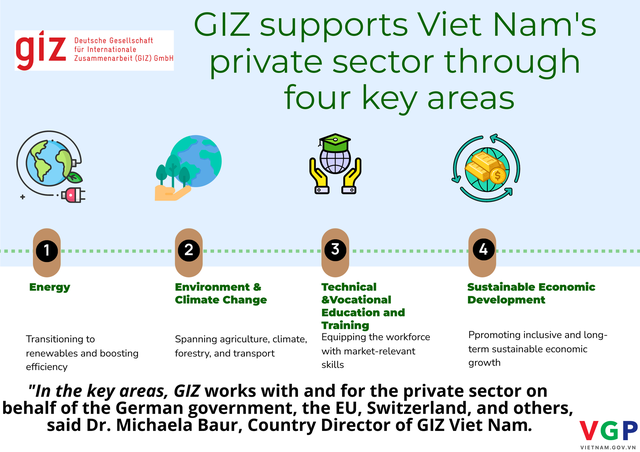GIZ highlights vital role of Government support for private sector
VGP - Sustained government support is crucial for enabling Viet Nam’s private sector to meet the rising global demand for environmentally and socially sustainable goods and services, according to Dr. Michaela Baur, Country Director of GIZ Viet Nam.

Dr. Michaela Baur, Country Director of GIZ Viet Nam
Speaking on the evolving role of the private sector in Viet Nam's economy, Dr. Baur noted: "The private sector is becoming the heart of the Vietnamese economy, contributing over 51 percent of GDP, generating more than 30 percent of state budget revenue, and employing over 40 million people—82 percent of the workforce."
Despite being dominated by micro and small enterprises—over 95 percent—Viet Nam's private sector is poised for growth.
"Tiny companies can grow to small, small to medium, and so on. Their relevance and involvement in global value chains will increase further," Dr. Baur added.
She emphasized the need for predictability, investment capital, skilled labor, strong value chain partnerships, and greater operational freedom as key enablers for enterprise growth and innovation.
Viet Nam's ambition to achieve double-digit growth and become a high-income, industrialized country by 2045 depends heavily on a stronger, more innovative private sector.
"More companies, bigger companies, more innovation, more integration with global markets—and importantly, greener and more sustainable," she said.
Supportive environment for growth
The domestic private sector benefits from a favorable ecosystem including a youthful workforce, robust economic momentum, government support, digital transformation opportunities, and increasing foreign investment. Regulatory reforms, financial support, improved infrastructure, and tax incentives have collectively created fertile ground for private sector development, particularly in high-value, tech-driven, and sustainable industries.
Still, challenges remain—especially in human capital. While skill development is improving, a gap persists between market needs and workforce capabilities, compounded by regional mismatches between labor supply and demand.

GIZ pledges multifaceted support
GIZ supports Viet Nam's private sector through four key areas namely Energy (transitioning to renewables and boosting efficiency); Environment and Climate Change (spanning agriculture, climate, forestry, and transport); Technical and Vocational Education and Training (equipping the workforce with market-relevant skills); and Sustainable Economic Development (promoting inclusive and long-term sustainable economic growth).
"The overarching theme of our work is just transition," said Dr. Baur. "We work with and for the private sector on behalf of the German government, the EU, Switzerland, and others."
Germany's partnership with Viet Nam in private sector development dates back to the early 1990s, contributing to key legal reforms including the Law on Domestic Investment Promotion (1994, 1998) and the Law on Enterprises (2000).
Today, GIZ's role has been expanded to promoting circular business models, helping SMEs integrate into ASEAN's liberalized markets, supporting digital and green transitions and strengthening their participation into global supply chains.
As part of its forward-looking initiatives, GIZ will establish a Twin Transition Hub in partnership with Viet Nam's Agency for Enterprise Development. The hub will support SMEs in the green and digital transition, particularly in Garment and textile, agro-processing and wood and paper processing
Other Programs of GIZ will help startups develop strategic plans, access international markets, and minimize waste, reinforcing Vietnam's circular economy ambitions.
"Germany's economy is built on SMEs—many of them are hidden champions. We're eager to share this know-how so Viet Nam can develop its own models that fit its unique context," Dr. Baur said.
Policy recommendations
Dr. Baur offered several policy recommendations to further enhance private sector development: Streamlining regulations and promote e-Government to ensure transparency Improving SME financing by supporting digital lending and alternative financing platforms, and enhancing capital markets; Upskilling the workforce, particularly for the digital economy, and subsidize rural digitalization efforts; and ensuring fair competition by accelerating SOE reforms and creating a level playing field for private firms.
In conclusion, Dr. Baur emphasized that inclusive green growth is the inevitable path for Viet Nam. Sustained government support is critical to ensuring the private sector can thrive in global value chains while meeting sustainability standards./.

